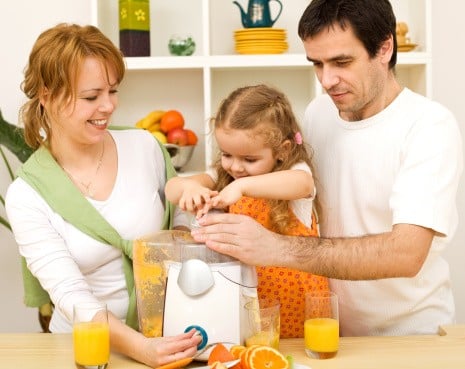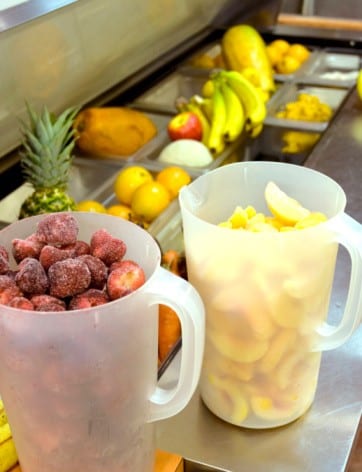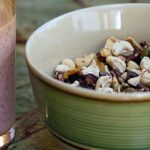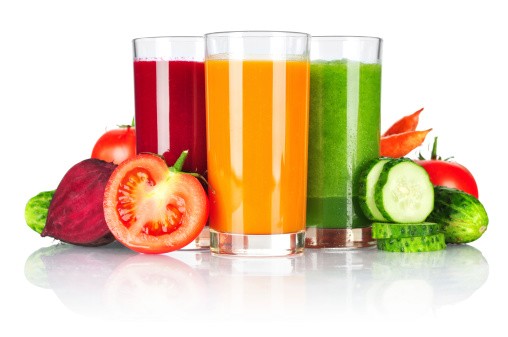Tips for a Healthy Juice Cleanse
Olivia Wilde’s doing it. Miranda Kerr’s doing it. Gwenyth Paltrow is doing it. I’m talking about a juice cleanse, of course, the hot new trend touting all sorts of health benefits. But should YOU do it, too?
The benefits of a routine juice cleanse.
Why is everyone raving about the juice cleanse? There are a number of benefits, according to Con Lazarakis, founder of SOLJUICE in Boulder, Colorado. “Juice cleansing is an excellent way to get a concentrated amount of vitamins and nutrients while fasting. During a cleanse, it’s not only what you’re putting into your body but what you are leaving out that is beneficial.” He notes that even if they already adhere to a diet void of added sugars, red meats and other processed foods, most people still tend to overeat. Matt Ruscigno, a registered dietician in Los Angeles, agrees that a routine juice cleanse can make people notice how much unnecessary food they consume. “One benefit is a mental reset,” he says. “People on a juice fast often realize how much they eat mindlessly. When they’ve introduced parameters they don’t snack on junk or eat out of boredom. And they realize how little they need to feel full.” Other healthcare experts agree on the positive capabilities of a good juice cleanse to banish or at least halt bad habits. An article on Health.com quotes Cathy Wong, a naturopathic doctor and nutrition specialist as saying that “but detoxes may shift you away from bad habits (like too much coffee, alcohol, and fatty foods) and help foster healthier habits after you’re done.” This can backfire, however, according to ABC  News, if you were prone to binge eating or had a severely restricted diet prior to your cleanse. Cynthia Cass, a registered dietician and the author of the article, also warns not to use juice cleansing as a method of purging.
News, if you were prone to binge eating or had a severely restricted diet prior to your cleanse. Cynthia Cass, a registered dietician and the author of the article, also warns not to use juice cleansing as a method of purging.
According to Con Lazarakis of SOLJUICE, there are a multitude of benefits that juice cleanses provide the body. “With juice cleansing you are…allowing your digestive system to recover. Most juices in our cleanse are very alkalizing so it’s a great way to balance your body’s ph levels, which is important because diseases thrive in an acidic environment. Juicing really does help to keep your body nourished and strong. I really can’t remember the last time I had a cold or flu!” Matt Ruscigno and other health professionals are more on the fence regarding whether or not cleanses are necessary. “I think most people who do juice fasts fall into two categories: People who generally eat very well- plant-based with lots of veggies, fruits, legumes with lots of fiber and antioxidants. These folks aren’t going to get any benefit from a ‘cleanse.’ They are cleansing every day!’ However, Ruscigno concedes that those who cleanse for the right reasons, including those with a poor diet that they wish to change, will likely get benefits. “It’s mostly from not eating all the crap they usually eat- refined grains and sugars, hydrogenated oils, animal fats, etc. They could get the same results from eating a balanced plant-based diet that includes salads, raw fruits, etc.”
A juice cleanse is NOT for everyone.
 Be sure to have the right intentions when deciding to cleanse. A poor reason to decide to do a cleanse is doing one simply because of your favorite celebrity. An article on the ABC News website warns, “don’t do it to be trendy.” Another poor reason to forgo solid food for three days in exchange for juice is a desire to lose weight. Though it is true that juice cleanses generally lead to weight loss, this is only temporary during the cleanse and you reintroduce food into your diet, the weight will typically come back as well. Ruscingno notes that positive change made while one a juice face is not sustainable. “The overwhelming majority of people just go back to their old diet and the associated health problems and risks. Plus juice doesn’t have fiber which is very helpful for ‘cleansing’ the gastrointestinal tract.”
Be sure to have the right intentions when deciding to cleanse. A poor reason to decide to do a cleanse is doing one simply because of your favorite celebrity. An article on the ABC News website warns, “don’t do it to be trendy.” Another poor reason to forgo solid food for three days in exchange for juice is a desire to lose weight. Though it is true that juice cleanses generally lead to weight loss, this is only temporary during the cleanse and you reintroduce food into your diet, the weight will typically come back as well. Ruscingno notes that positive change made while one a juice face is not sustainable. “The overwhelming majority of people just go back to their old diet and the associated health problems and risks. Plus juice doesn’t have fiber which is very helpful for ‘cleansing’ the gastrointestinal tract.”
According to an article on The Daily Beast website, pregnant women, the elderly, and those with compromised immune systems should stay away from juice cleanses. A Huffington Post article also warns that “people undergoing chemotherapy, diabetics, people with nutritional deficiencies and people with kidney disease should not try a juice fast.” This is mainly due to the fact that juices comprising cleanses tend to be organic, raw, and unpasteurized, creating the risk that they may harbor harmful bacteria. Consulting with your healthcare provider prior to initiating a cleanse is a wise idea.
Selecting the right fruits and vegetables.
These cleanses vary widely and include different kinds of bottled juiced fruits and vegetables like kale, apples, lemons, spinach, and beets. Juiceries are sprouting up like weeds all over the place, offering customizable  lines of juices for cleansers leading different lifestyles. Most of these companies offer to hand deliver these juices to your door or allow you to pick them up. How do you know which cleanse to choose? When selecting a cleanse, Con Lazarakis, of SOLJUICE in Boulder, Colorado, recommends one made up of 100% organic juices. “This is better for your body, the environment and the farmers growing the produce,” he says. “Non-organic vegetables can be heavily sprayed with pesticides, and you don’t want to be ingesting chemicals.” He also warns about store-bough juices. “Most store bought juices, even though labeled raw, have gone through a process called high pressure pascalization (HPP). HPP extends the shelf life of the juice up to 3 weeks. We believe this is neither fresh nor raw.” BluePrint Cleanse is one popular cleanse program offering three lines of raw and organic juice cleanses delivered right to your door everywhere in the United States and Canada.
lines of juices for cleansers leading different lifestyles. Most of these companies offer to hand deliver these juices to your door or allow you to pick them up. How do you know which cleanse to choose? When selecting a cleanse, Con Lazarakis, of SOLJUICE in Boulder, Colorado, recommends one made up of 100% organic juices. “This is better for your body, the environment and the farmers growing the produce,” he says. “Non-organic vegetables can be heavily sprayed with pesticides, and you don’t want to be ingesting chemicals.” He also warns about store-bough juices. “Most store bought juices, even though labeled raw, have gone through a process called high pressure pascalization (HPP). HPP extends the shelf life of the juice up to 3 weeks. We believe this is neither fresh nor raw.” BluePrint Cleanse is one popular cleanse program offering three lines of raw and organic juice cleanses delivered right to your door everywhere in the United States and Canada.
If you do decide that a juice cleanse is right for you, most professionals recommend keeping it to a few days. An article on the ABC News website recommends not pulling a double-whammy and working out while cleansing, as doing so can break down muscle mass. Overall, most health professionals agree that cleanses, though they may not be necessary, can be beneficial if kept to a limited number of days.








